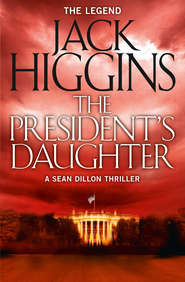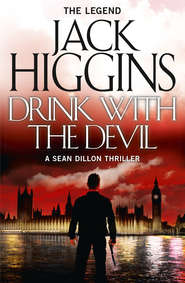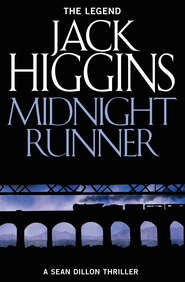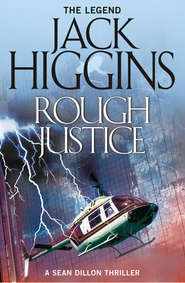По всем вопросам обращайтесь на: info@litportal.ru
(©) 2003-2024.
✖
Night of the Fox
Автор
Год написания книги
2019
Настройки чтения
Размер шрифта
Высота строк
Поля
‘Sean!’ she called and stumbled almost falling.
He lowered the axe and turned, pushing a lock of reddish brown hair from his eyes as he looked toward her. He dropped the axe and reached out to catch her as she almost fell again.
Sean Martin Gallagher was fifty-two and, as an Irish citizen, officially neutral in this war. He had been born in Dublin in 1892, his father a professor of surgery at Trinity College, a man who had taken no interest in women until, in his fiftieth year during a professional visit to Jersey, he had met a young nurse called Ruth le Brocq. He’d married her within a month and taken her back to Dublin.
She’d died in childbirth the following year and the boy Sean grew up spending the long summers each year in Jersey with his grandparents, the rest of the time in Dublin with his father. Sean’s ambition was to be a writer, and he’d taken a degree in literature at his father’s university, Trinity College. The exigencies of life made him a soldier, for as he finished college the First World War started.
He’d joined the Irish Fusiliers, a regiment that many Jerseymen served in, and by 1918 was a very old twenty-six. A major, twice wounded, and with an MC for gallantry on the Somme. As he used to say, any real experience of war came after that, fighting with the IRA in Ireland under Michael Collins’ leadership, as commander of a flying column in County Mayo.
The treaty with the British government which had ended the conflict in 1922 had only proved a prelude to a bloody and vicious civil war between those elements of the IRA who refused to accept the treaty and those who chose to fight for the Irish Free State government under Collins. Sean Gallagher had chosen the Free State and found himself a general at the age of thirty, sweeping through the west of Ireland, ruthlessly hunting down old comrades.
Afterward, sick of killing, he’d traveled the world, living on money left to him by his father, writing the odd novel when he had a mind, finally settling in Jersey in 1930. Ralph de Ville had been a boyhood friend, and Helen he had loved desperately and hopelessly from the first moment they had met. His home in St Lawrence, deep in the country, had been requisitioned by the Germans in 1940. Helen, with Ralph away serving with the British Army, needed a strong right arm, which explained his presence at the dower cottage on the estate. And he still loved her, of course, and still quite hopelessly.
The old cart had seen better days and the horse was considerably leaner than it should have been as they negotiated the track down to the beach, Sean Gallagher leading the horse, Helen at his side.
‘If this goes wrong,’ he said gravely. ‘If they find out you’re helping this man, it won’t just be a prison sentence. It could mean a firing squad or one of those concentration camps they’re talking about.’
‘And what about you?’
‘Jesus, woman, I’m a neutral, don’t I keep telling you that?’ He smiled mischievously, the gray eyes full of humor. ‘If they want to keep that old bastard, de Valera, sweet back in Dublin, they’ve got to handle me with dress gloves. Mind you, after the way I chased the arse off him all over Ireland in the Civil War, he might welcome the news that they want to shoot me.’
She burst out laughing. ‘I love you, Sean Gallagher. You always make me feel good at the worst times.’ She put an arm around the small, lean man’s shoulders and kissed him on the cheek.
‘As a brother,’ he said. ‘You love me as a brother, as you often remind me, so keep your mad passion in your pocket, woman, and concentrate. Colonel Hugh Kelso, he said, an American army officer torpedoed off Devon?’
‘That’s right.’
‘And what was all that about how the Germans mustn’t get their hands on him?’
‘I don’t know. He was half out of his mind and his leg’s in a terrible state, but at the suggestion he might have to go to hospital he went crazy. Said it would be better if I shot him.’
‘A fine old mess from the sound of it,’ Gallagher said, and led the horse down onto the fog-shrouded beach.
It was very quiet, the sea calm, so quiet that they could hear the whistle of the German military train from across the bay as it ran along the front from St Helier to Millbrook.
Hugh Kelso lay face-down on the sand unconscious. Sean Gallagher turned him over gently and examined the leg. He gave a low whistle. ‘He needs a surgeon, this lad. I’ll get him in the cart while he’s still out. You gather as much driftwood as you can and hurry.’
She ran along the beach and he lifted Kelso up, taking his weight easily, for he was surprisingly strong for a small man. Kelso groaned but stayed out, and the Irishman eased him onto the sacks in the cart and draped a few across him.
He turned as Helen came back with an armful of wood.
‘Cover him with that while I see to the life raft.’
It was still bumping around in the shallows, and he waded into the water and pulled it up on the sand. He looked inside, removed the emergency kit, then took out a spring-blade gutting knife and slashed at the skin of the life raft fiercely. As air rushed out, it crumpled and he rolled it up and carried it to the cart, shoving it onto the rack underneath.
Helen arrived with another armful of wood which she put in the back with the rest. ‘Will that do?’
‘I think so. I’ll stop by the paddock and we’ll put the life raft down the old well shaft. But let’s get moving.’
They started up the track, Helen sitting on the shaft of the cart, Sean leading the horse. Suddenly there was laughter up ahead and a dog barked. The Irishman paused and took his time over lighting one of the vile French cigarettes that he smoked. ‘Nothing to worry about, I’ll handle it,’ he told her.
The Alsatian arrived first, a splendid animal which barked once, then recognized Gallagher as an old friend, and licked his hand. Two German soldiers in field gray and helmets, rifles over their shoulders, came next. ‘Guten morgen, Herr General,’ they both called eagerly.
‘And good morning to you two daft buggers.’ Gallagher’s smile was his friendliest as he led the horse on.
‘Sean, you’re quite mad,’ she hissed.
‘Not at all. Neither of those two lads speak a word of English. It might have been fun if they’d looked under the cart though.’
‘Where are we going?’ she demanded. ‘There’s no one at the Place at the moment.’
It was always referred to in that way, never as a house.
‘Isn’t Mrs Vibert in?’
‘I gave her the day off. Remember that niece of hers had a new baby last week.’
‘Naughty girl,’ Gallagher said. ‘And her man away serving in the British Army. I wonder what he’ll think when he comes home and finds a bouncing boy with blue eyes and blond hair called Fritz.’
‘Don’t be cruel, Sean. She’s not a bad girl. A little weak perhaps. People get lonely.’
‘Do you tell me?’ Gallagher laughed. ‘I haven’t exactly noticed you chasing me around the barn this week.’
‘Be sensible,’ she said. ‘Now where do we take him? There’s the Chamber.’
During the English Civil War, Charles de Ville, the Seigneur of the manor at that time, had espoused the Royalist cause. He’d had a room constructed in the roof with a secret staircase from the master bedroom known to the family over the years as the Chamber. It had saved his life during the time of Cromwell’s rule when he was sought as a traitor.
‘No, too awkward at the moment. He needs help and quickly. We’ll take him to my cottage first.’
‘And what about a doctor?’
‘George Hamilton. Who else could you trust? Now hang on while I get this life raft down the well.’
He tugged it out and moved into the trees. She sat there, aware of her uneven breathing in the silence of the wood. Behind her, under the sacking and the driftwood, Hugh Kelso groaned and stirred.
At Slapton Sands just before noon, the tide turned and a few more bodies came in. Dougal Munro and Carter sat in the lee of a sand dune and had an early lunch of sandwiches and shared a bottle of beer. Soldiers tramped along the shoreline, occasionally venturing into the water at some officer’s command to pull in another body. There were already about thirty laid out on the beach.
Munro said, ‘Someone once said the first casualty when war comes is truth.’
‘I know exactly what you mean, sir,’ Carter said.
A young American officer approached and saluted. ‘The beach is cleared of new arrivals at the moment, sir. Thirty-three since dawn. No sign of Colonel Kelso.’ He hesitated. ‘Does the Brigadier wish to view the burial arrangements? It’s not too far.’
‘No thank you,’ Munro told him. ‘I think I can manage without that.’
The officer saluted and walked away. Munro got up and helped Carter to his feet. ‘Come on, Jack. Nothing we can do here.’
‘All right, sir.’











